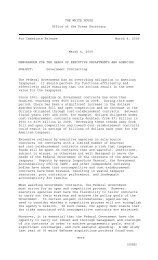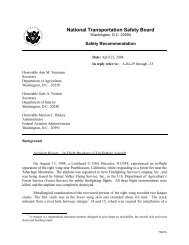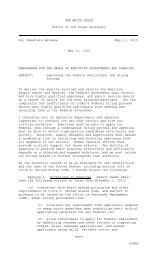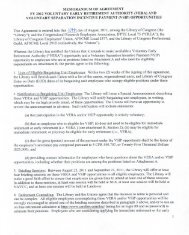Accenture's fifth annual global e-government study
Accenture's fifth annual global e-government study
Accenture's fifth annual global e-government study
You also want an ePaper? Increase the reach of your titles
YUMPU automatically turns print PDFs into web optimized ePapers that Google loves.
The countries in the mid-range of maturity that<br />
are currently on an upswing are France and the<br />
Netherlands. France has not done anything dramatic<br />
to improve; rather it spent several years putting its<br />
eGovernment foundations in place and identifying<br />
clear priorities. It then moved forward slowly and<br />
steadily—minimizing peaks and lows in its progress.<br />
The country very recently unveiled a new strategy and<br />
action plan for 2004 through 2007 that emphasizes<br />
the major elements of transformation—customerfocused<br />
service, transparency and measurable<br />
objectives.<br />
The Netherlands and Norway (which has 49 percent<br />
maturity) have followed nearly identical patterns of<br />
growth since the beginning of our <strong>study</strong>. After a few<br />
years of slow growth both countries decidedly accelerated<br />
their pace of progress over the past year and<br />
are likely to continue to improve. The Netherlands is<br />
taking steps to corral its many strong but disconnected<br />
services into one website. That move, plus<br />
the country’s historically strong emphasis on customer<br />
relationship management, sets the stage for<br />
continued progress upward.<br />
Norway also may be poised for dramatic advancement,<br />
particularly in relation to its business-focused<br />
services. One of its most significant developments<br />
during the past year was the launch of Altinn in<br />
late 2003. The program is important because Altinn<br />
provides a common Internet-based solution for<br />
reporting financial data from businesses and citizens<br />
to agencies across the <strong>government</strong>. Altinn will likely<br />
prove to be a significant eGovernment enabler for a<br />
whole range of new and enhanced eGovernment<br />
services for businesses and citizens in the near future.<br />
The country’s minister for International Economic<br />
Affairs and Financial Markets expressed the opinion<br />
that future involvement from the central <strong>government</strong><br />
in regional eGovernment strategies and actions<br />
would come in the form of encouragement, not<br />
central decrees.<br />
Looking at the growth patterns among the top<br />
three ranking leaders also reveals some interesting<br />
developments (see Figure 4).<br />
Canada continued to increase the gap between<br />
itself and the remainder of the countries, including<br />
number two-ranked Singapore and the United<br />
States. These two countries each grew approximately<br />
6 percent, as opposed to Canada’s 9 percent. Once<br />
again, Canada’s focus on self-examination and its<br />
relentless pursuit of user feedback have allowed it<br />
to continue to build what is clearly one of the<br />
world-leading customer-focused <strong>government</strong><br />
online programs.<br />
Yet, while all three countries continue to make<br />
steady progress, only Singapore shows signs of an<br />
upswing in its growth rate. The causes are the same<br />
as in other tiers of maturity. Singapore’s eGovernment<br />
program has been reinvigorated within the past 12<br />
months. The country had an above-average improvement<br />
in its overall customer relationship management<br />
score. It also updated its eGovernment action plan in<br />
Figure 4: Growth rates: Top three overall<br />
maturity<br />
30<br />
25<br />
Finally, we should look briefly at Sweden, which<br />
made its debut this year in a joint fourth-place<br />
position. While no growth data is available for<br />
the country from past studies, results from this<br />
year showed that Sweden is already a strong<br />
eGovernment performer. Whether it can maintain its<br />
solid position remains to be seen. The country has a<br />
highly decentralized eGovernment program, to which<br />
it attributes its successes to date. To make further<br />
maturity advances, however, Sweden may need to<br />
undertake a serious effort to coordinate these services<br />
for truly seamless interactions for its customers.<br />
Coordination is not likely to stem from mandates.<br />
20<br />
15<br />
10<br />
5<br />
0<br />
Y2001<br />
OM Change<br />
Canada<br />
Singapore<br />
Y2002<br />
OM Change<br />
United States<br />
Average<br />
Y2003<br />
OM Change<br />
Y2004<br />
OM Change<br />
11













